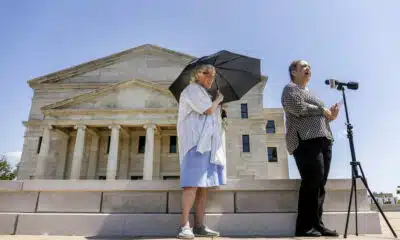Mississippi News
U.S. Supreme Court asked to overturn felony voting ban
U.S. Supreme Court being asked to remove last vestige of Jim Crow from state Constitution
The United States Supreme Court is being asked to find unconstitutional Mississippi’s lifetime ban on people convicted of many felonies being able to vote.
“The justices normally take about 1% of the cases they are asked to hear, but I think the odds are higher here,” said Rob McDuff, one of the attorneys who filed the case and director of the Impact Litigation Project at the Mississippi Center for Justice. “This is an important and interesting case.
“And it deals with issues that we are still grappling with in terms of race.”
The nation’s highest court is being asked to overturn the provision of the Mississippi’s constitution that places a lifetime ban on voting in most instances on people convicted of certain felonies — crimes that the framers of the 1890 state constitution said Black Mississippians were more prone to commit.
The framers did not disenfranchise people convicted of murder or rape, for instance, but did strip voting rights of people convicted of several “lesser crimes,” which the writers of the constitution falsely believed would be committed by African Americans.
The provision was one of many placed in the Jim Crow-era state constitution to keep Black people, then a majority in the state, from voting. Those other provisions, such as a poll tax and literacy tests, have been ruled unconstitutional.
But the U.S. 5th Circuit Court of Appeals upheld the felony disenfranchisement provision in a split decision in August. The entire 17-member Court heard the case, and seven judges dissented from the majority opinion.
The majority opinion upholding the lifetime ban was unsigned. Circuit Judge James Graves Jr., who before being appointed to the U.S. 5th Circuit Court of Appeals was only the third African American to serve on the Mississippi Supreme Court, wrote a blistering dissent, describing in sometimes graphic details Mississippi’s history of racial discrimination.
The office of Attorney Lynn Fitch defended the felony disenfranchisement provision before the federal judges. Even those who uphold the provision conceded that it was added to the constitution with the intent of keeping Black people from voting.
But the majority decision was based, in large part, on the fact that in 1950 the Legislature passed a proposal approved by voters to remove burglary as one of the disfranchising crimes. And in the 1960s, the Legislature and ultimately the voters approved a provision making murder and rape disenfranchising crimes.
Those changes, the majority found, removed the “racial taint” from the original 1890 language. But McDuff pointed out that those changes were made during an era of intense racial conflict and discrimination in the state. Perhaps, more importantly, the changes did not allow Mississippians to vote on whether to remove lifetime bans from voting on people convicted of other felonies.
Or as Graves wrote in his dissent, “Mississippians have simply not been given the chance to right the wrongs of its racist origins. And this court … deprives Mississippians of this opportunity by upholding an unconstitutional law enacted for the purpose of discriminating against Black Mississippians on the basis of race.”
The 5th Circuit is viewed as one of the most conservative federal courts in the nation. McDuff conceded the current makeup of the Supreme Court also is conservative, but he expressed optimism the justices would hear the case.
“Although the Supreme Court has become more conservative in recent years, we hope it will see that the continued implementation of this racist provision is an affront to the promise of the Equal Protection of the Law contained in the Fourteenth Amendment to the U.S. Constitution,” McDuff said. “This is another step forward in our lengthy legal battle to strike down the racially motivated provision in the Mississippi Constitution, which denies thousands of Mississippians the right to participate in our democracy.”
A decision on whether the Supreme Court will hear the Mississippi case most likely will be made sometime in the first half of 2023.
The Mississippi Center for Justice among other groups brought the lawsuit on behalf of two Black Mississippians who had lost the right to vote: Roy Harness and Kamal Karriem, convicted of forgery and embezzlement, respectively.
Mississippi is one of fewer than 10 states where people convicted of felonies do not get their right to vote restored at some point after serving their sentence.
In Mississippi, people with felony convictions must petition the Legislature to get a bill passed by a two-thirds majority of both chambers to regain voting rights. Normally only a handful (less than five) of such bills are successful each session. There is also the option of the governor granting a pardon to restore voting rights, but no governor has granted pardons since Haley Barbour in 2012.
For a subset of those who lose their rights, the courts can expunge their record. In some instances that expungement includes the restoration of voting rights, while for others it does not. That outcome depends on the preference of the judge granting the expungement.
Those crimes placed in the constitution where conviction costs a person the right to vote are bribery, theft, arson, obtaining money or goods under false pretense, perjury, forgery, embezzlement, bigamy and burglary.
Under the original language of the constitution, a person could be convicted of cattle rustling and lose the right to vote, but those convicted of murder or rape would still be able to vote — even while incarcerated.
“Our country’s ideals of equality and freedom are swiftly undermined by Mississippi’s insidious practice of felony disenfranchisement, which is one of voter suppression’s most effective tools,” said Vangela Wade, chief executive officer of the Center for Justice. “Too many Mississippians, particularly people of color, face enormous hurdles to accessing the ballot box. We hope the U.S. Supreme Court will strike down this 132-year-old racist provision in the Mississippi Constitution.”
Editor’s note: Vangela M. Wade is a member of Mississippi Today’s board of directors.
This article first appeared on Mississippi Today and is republished here under a Creative Commons license.
Mississippi News
Defendant in Mississippi auditor’s ‘second largest’ embezzlement case in history goes free
SUMMARY: Four years ago, Tunica nonprofit operator Mardis Jones was arrested for allegedly embezzling over $1 million from a county home rehabilitation program funded by casino revenue. The state auditor accused Jones of misusing funds meant to help vulnerable residents, claiming little money reached contractors. Jones’ defense cited poor program administration and insufficient evidence of theft, with a jury ultimately acquitting him last month. Despite the criminal acquittal, the auditor’s office demanded repayment through a civil claim, which the attorney general’s office had yet to act on, but recently confirmed receipt of the demand letter. The case highlights issues in government oversight and program management.
The post Defendant in Mississippi auditor’s ‘second largest’ embezzlement case in history goes free appeared first on www.wjtv.com
Mississippi News
Events happening this weekend in Mississippi: June 27-29
SUMMARY: This weekend (June 27-29) in Mississippi offers a variety of events across the state. Central Mississippi hosts the Kiwanis Club of Pearl Golf Tournament, multiple hot air balloon events including the Mississippi Championship Hot Air Balloon Festival in Canton, and exhibitions like Hurricane Katrina: Mississippi Remembers in Jackson. There are also family-friendly activities such as Guys and Dolls Jr. in Natchez, Pilates and yoga events in Jackson, and farmers markets in Jackson, Natchez, and Vicksburg. The Pine Belt region features Story Time with a Soldier in Hattiesburg, immersive theater experiences, karaoke, and runs supporting recovery programs in Laurel.
The post Events happening this weekend in Mississippi: June 27-29 appeared first on www.wjtv.com
Mississippi News
Traveling for July Fourth? When to expect the worst traffic, busiest airports
SUMMARY: With the Fourth of July on a Friday, AAA expects a record 72.2 million Americans to travel domestically over the long weekend, including 61.6 million by car—a 2.2% increase from last year. Busiest driving days are July 2 and 6, with afternoon hours the most congested. Major highways in cities like Atlanta, Boston, Chicago, and New York will see peak traffic. AAA advises early departures and vehicle maintenance. TSA anticipates 5.84 million air travelers during the week, a 1.4% increase, with July 6 the busiest airport day. Popular destinations include Orlando, Seattle, and New York, while Vancouver tops international spots.
The post Traveling for July Fourth? When to expect the worst traffic, busiest airports appeared first on www.wjtv.com
-
News from the South - Tennessee News Feed6 days ago
Thieves take thousands of dollars in equipment from Union County Soccer League
-
Mississippi Today4 days ago
Defendant in auditor’s ‘second largest’ embezzlement case in history goes free
-
News from the South - Texas News Feed6 days ago
Robert Nichols to retire from Texas Senate
-
News from the South - Louisiana News Feed6 days ago
3 lawsuits filed against CVS, Louisiana AG announces
-
News from the South - Missouri News Feed6 days ago
Residents provide feedback in Kearney Street Corridor redevelopment meeting
-
News from the South - Alabama News Feed6 days ago
News 5 NOW at 12:30pm | June 24, 2025
-
The Conversation6 days ago
The Vera C. Rubin Observatory will help astronomers investigate dark matter, continuing the legacy of its pioneering namesake
-
News from the South - Florida News Feed6 days ago
DeSantis signs bill into law that ensures public access to Florida beaches | Florida












































